Marketers are always on the lookout for newer, appealing ways to reach their target audiences for lead generation. Among such recent tools, the concept of marketing quizzes has been highly promoted. An intuitive-created marketing quiz would increase user interaction, enhance capturing leads, and retrieve useful data about your audience. In this article, we’ll be discussing how you can create a marketing quiz to improve your business online. We’re going to go through what marketing quizzes are, their benefits, the type of quizzes you may want to run, and give you some real-world tips that can ensure success.
- What Are Marketing Quizzes and its Benefits?
- What Are The Benefits of Marketing Quizzes?
- Types of Online Marketing Quizzes
- How to Make an Interactive Marketing Quiz with Video in OnlineExamMaker?
- Tips to Make A Successful Marketing Quiz
What Are Marketing Quizzes and its Benefits?

Marketing quizzes are an interactive online tool that can be used to capture user interest via a series of questions on a specific topic. These can be on the products and services your brand provides or general industry themes. In addition, they find applications in capturing user data, qualifying leads, and promoting products. Normally, users answer a series of multiple-choice questions that lead to a personalized result or recommendation at the end.
The magic of a marketing quiz is in the format. Everybody likes to learn something new about themselves, be it their personality type, product preferences, or level of knowledge on a specific type of topic. Marketers take that as a strength by creating quizzes that would subtly lead users down the marketing funnel while providing value in fun, interactive ways.
What Are The Benefits of Marketing Quizzes?
Widened participation
Quizzes, by nature, mean participation and interaction. They lure in users who are naturally curious and motivated to finish them, thus increasing time spent on your website or platform.
Lead generation
Quizzes can be an effective lead magnet in marketing, whereby one needs to give away contact information like email addresses to get personalized results or recommendations. This helps build your list for email marketing.
Fuller customer insights
A well-conducted quiz can offer much-needed information on your audience’s preferences and behavior in addition to their needs. Quizzes will now give a business enterprise a better insight into customers through data analyses for more effective marketing strategies.
Brand awareness and visibility
Quizzes are super shareable content, and most of the time, they go viral on social media platforms. Your brand’s visibility will increase, and it can widen your audience without extra marketing efforts.
Just so you know
With OnlineExamMaker quiz making software, anyone can create & share interactive marketing quizzes easily.
Personalized recommendations
You can create quizzes that can let the users, based on their responses, get recommendations for either products or services. This could improve conversion rates since this offering aligns well with individual preferences.
High conversion rates
Since quizzes represent a low-pressure request to ask of users to engage, they can often facilitate higher conversion rates when users browse through traditional calls to action. Users feel they are getting value first prior to making a purchasing decision.
Better SEO
The more time users spend on your website and engage with your content, the friendlier the search engines will be towards your website. Marketing quizzes can help lower bounce rates and raise time on site, both factors helping to improve SEO rankings.
Types of Online Marketing Quizzes
When planning a marketing quiz, one should not look for a sole strategy that fits all situations. The type of quiz one is going to make would utterly depend upon the goals of one’s intention and also the nature of one’s target audience. A few of the most popular varieties of marketing quizzes are stated as follows:
1. Personality quizzes
Example: “What Kind of Shopper Are You?”
Personality-type quizzes are the most popular variant of quizzes. A desire to learn more about one’s self is tapped into with these quizzes-usually light-hearted and fun in return. These quizzes ask a series of questions that are designed to match users to a specific personality type or profile based on their answers.
Personality quizzes also allow businesses to segment an audience. For example, an e-commerce fashion retailer might create a quiz that sorts users into various “shopper types”; for example, bargain hunter, fashionista, and trendsetter. It then would recommend a range of products to each based on the outcome.
Benefits:
• Perfect for segmenting your audience according to personality type or preference.
• Ideal for industries dealing with fashion, traveling, fitness, and beauty.
• High engagement due to the curiosity factor.
2. Product recommendation quizzes
Example: “Which Skincare Product Is Right for You?”
Product recommendation quizzes are used to make decisions on what to purchase by narrowing down your product catalog to exactly what they need or want. Most of these quizzes ask the user about his or her likes, worries, or needs, then tell them about a certain recommendation based on those answers.
This type of quiz works for businesses ranging from beauty brands to tech companies and to home goods stores, which carry a large number of products. These can reduce decision fatigue by guiding customers to the most relevant products that could help in increasing conversions.
Benefits:
• It directly drives product purchases.
• Helps the user overcome decision paralysis by reducing choices.
• Can increase average order value through personal upselling.
3. Trivia/Knowledge quizzes
Example: “How Well Do You Know Your Favorite TV Shows?
Knowledge or trivia quizzes test the knowledge of the users in certain subjects. Most of these quizzes are fun and challenge users to show their cognition of any fact. You could also use them to establish your brand as an authority or thought leader in your niche.
For example, a business in the health and fitness industry could give an online quiz on nutritional and exercise science. This educates the users, entertaining them at the same time, building trust in them with your brand by creating value first.
Benefits:
• Helps position your brand as an industry authority.
• Educates users while engaging them.
• Encourages social sharing, since people love to show their quiz results.
4. Testing quizzes
Example: “How Prepared Are You to Begin Your Own Venture?”
Assessment quizzes test a user’s status or preparedness concerning a certain goal. Mostly, these quizzes are somehow serious and offer insight based on what a user may input. For example, an entrepreneur-focused company may use an assessment quiz to show the entrepreneurs just how ready they actually are before starting a business.
Assessment quizzes have their application in qualifying leads in businesses. A financial services firm might utilize a quiz to gauge whether the prospect is, in fact, suited for their type of loan product. On the contrary, early elimination saves less accredited leads from the scene.
Benefits:
• Ideal for qualifying leads.
• Offers helpful, actionable insights for users.
• They can help build trust because this gives users accurate, meaningful results.
5. Surveys and feedback quizzes
Example: “How Satisfied Are You with Our Service?
Surveys or feedback quizzes are variants of quizzes applied in the capture of customer insights to help improve your business. They ask users for an opinion or feedback about certain things associated with your products, services, or experiences and serve as rich sources of information for the improvement of customer service, optimization of product offering, or even fine-tuning a marketing effort.
For instance, you can provide the customers with some short quiz after purchasing, asking about their experience. You will learn from it and refine your customer satisfaction.
Benefits:
• Provides direct customer feedback.
• It helps identify pain points and areas for improvement.
• Can increase customer loyalty by showing that you care about their opinion.
How to Make an Interactive Marketing Quiz with Video in OnlineExamMaker?
It’s rather simple to envision an online, interactive marketing quiz that allows persons to take part in a fun way and also becomes a lead capture device. You can make the quiz even more engaging by adding elements of video to it. Herein, we will demonstrate how to make a marketing quiz in just a few easy steps using OnlineExamMaker.
Create Your Next Quiz/Exam with OnlineExamMaker
Sign up on OnlineExamMaker
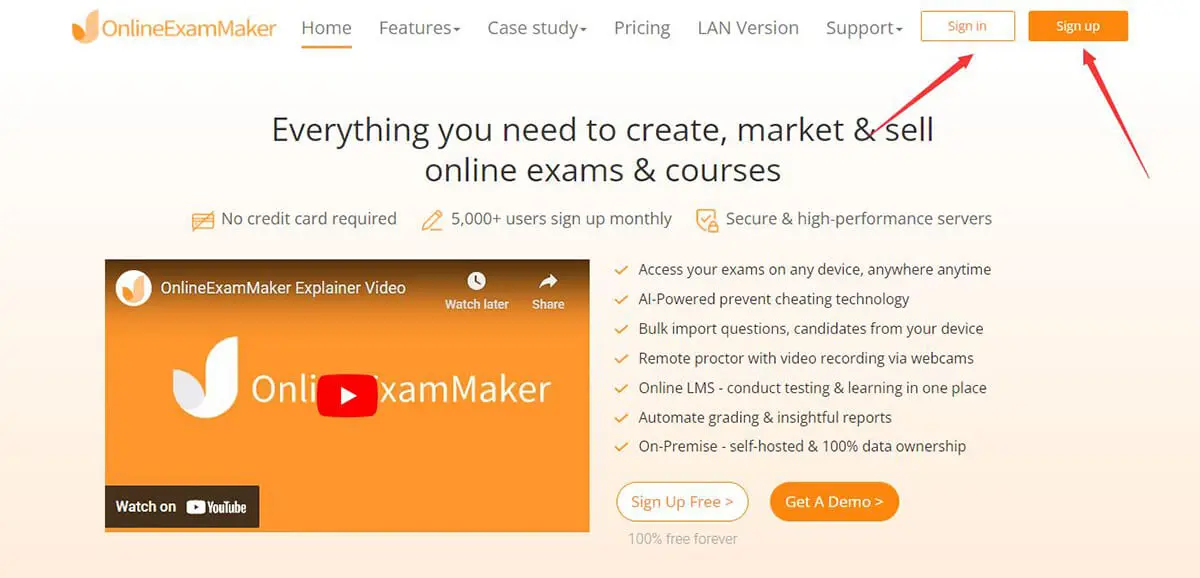
First of all, reach the site known as OnlineExamMaker. Access the version for free and use various options available in designing your quiz. Click “Sign Up” to create an account with all the required information. Now, having signed up, you are good to go to build your quiz.
Prepare your quiz questions
Before you build your quiz, it’s essential that you think about what questions you make and if the questions are appropriate for your target audience. If you are creating a marketing quiz, for example, the questions should be based on accurate information from credible sources.
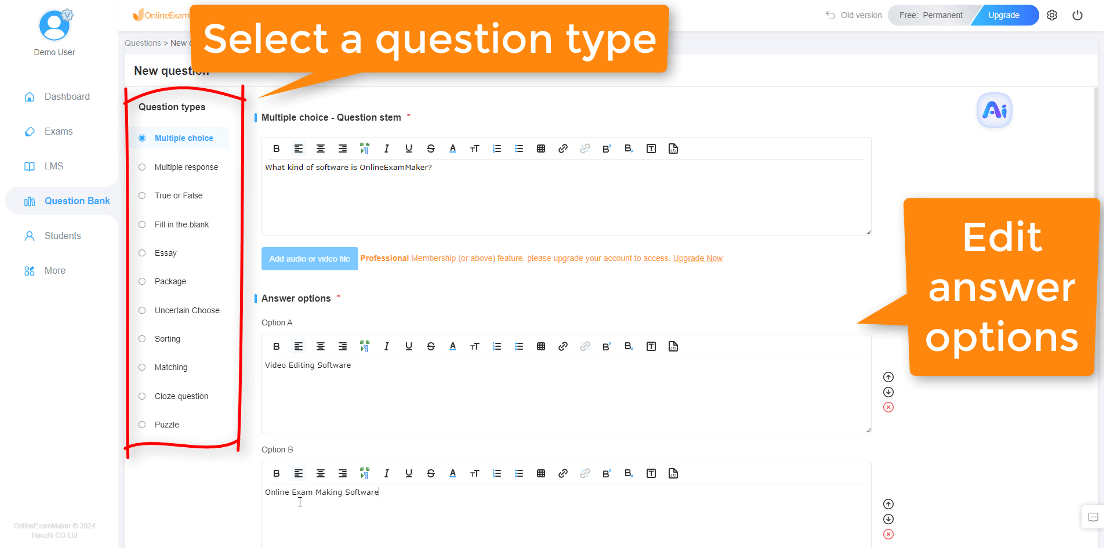
Now that you have your questions, in OnlineExamMaker, click on “Question Bank.” To view or create new questions, click “Question List.” Click the “New Question” button. To make it a lot more interactive, the provided formats of the questions include multiple-choice questions, true/false, and fill-in-the-blanks.
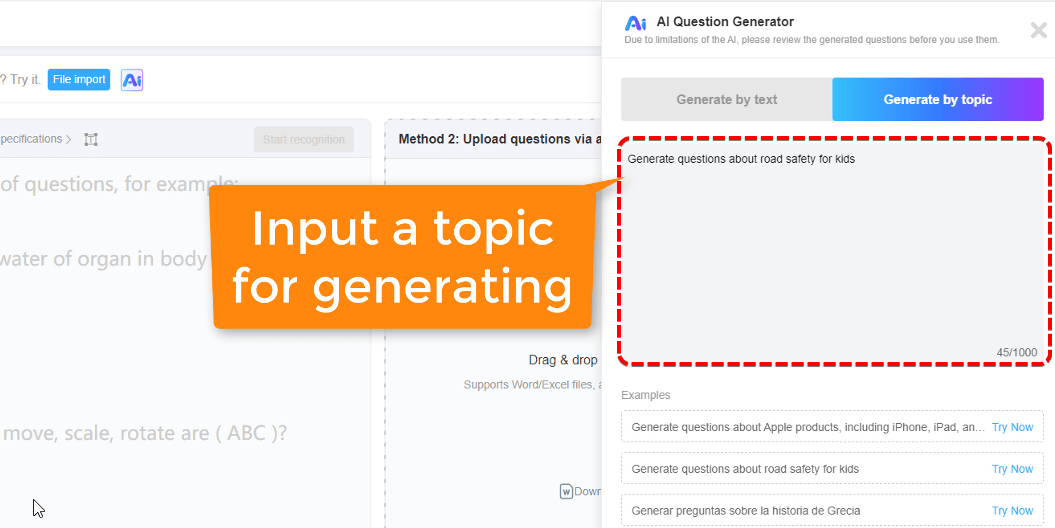
You can launch the AI Question Generator and generate questions for your marketing quiz automatically using AI. OnlineExamMaker provide 2 methods to generate questions: Generate by keywords or generate by texts.
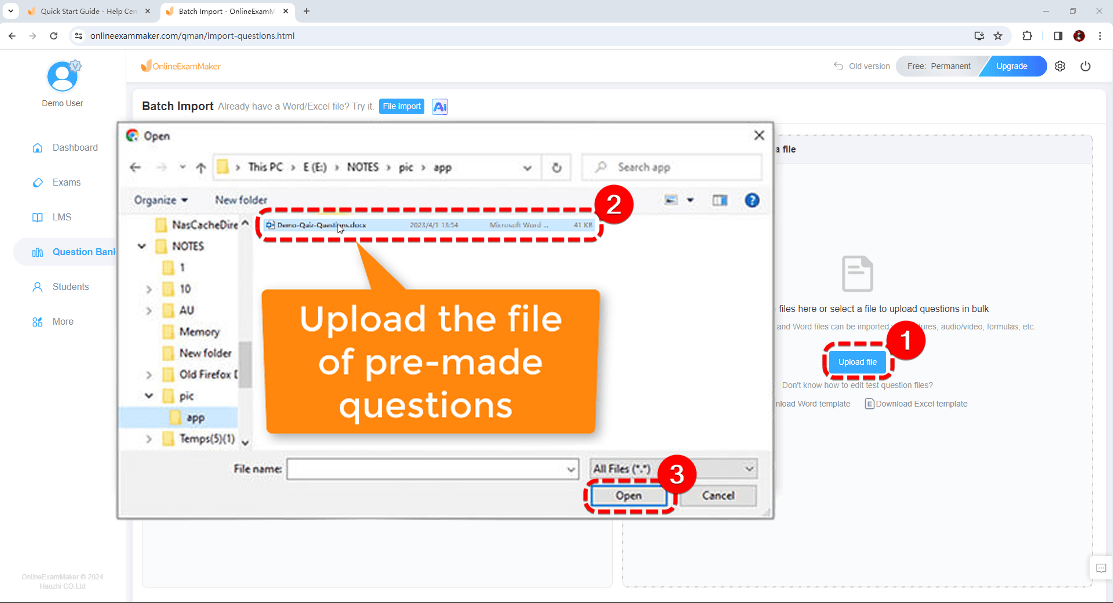
You can also upload questions if you have already prepared them on a separate document, using the “Import Question” feature. Prevent duplication by checking for it with the use of the “Check Duplication” feature, so no questions are repeated.
Enrich quiz questions with video
Select a question in OnlineExamMaker Question Bank, then click “Edit question” button, click “Add video or audio” button, you can add video or audio to the question description or answer options directly.
Now that your questions are prepared, it is time to build the actual quiz. Click on the tab entitled “Exams,” click “Exams List,” and then select “New Exam” to begin construction.
Steps to build:
1. Give your quiz a title
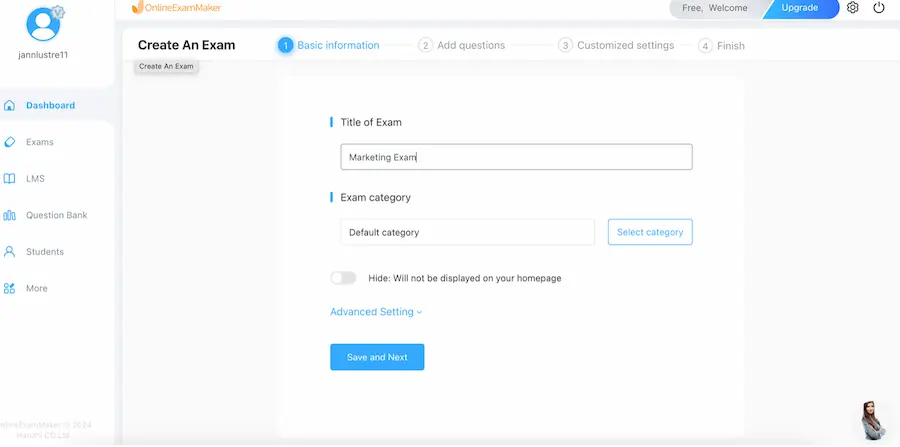
Name your quiz with an attention-seeking title which can give it a real feel. Example: “What Kind of Marketer Are You?” will be enough to set the tone for a good read.
2.Insert questions
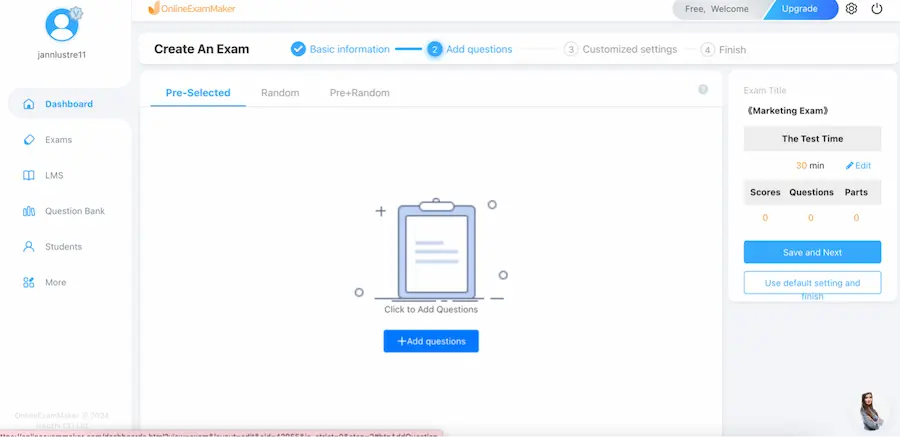
Use the “Add Question” tab, then select from your pool of questions prepared earlier. You may arrange and reorder them so that navigation through the quiz is smooth and logical.
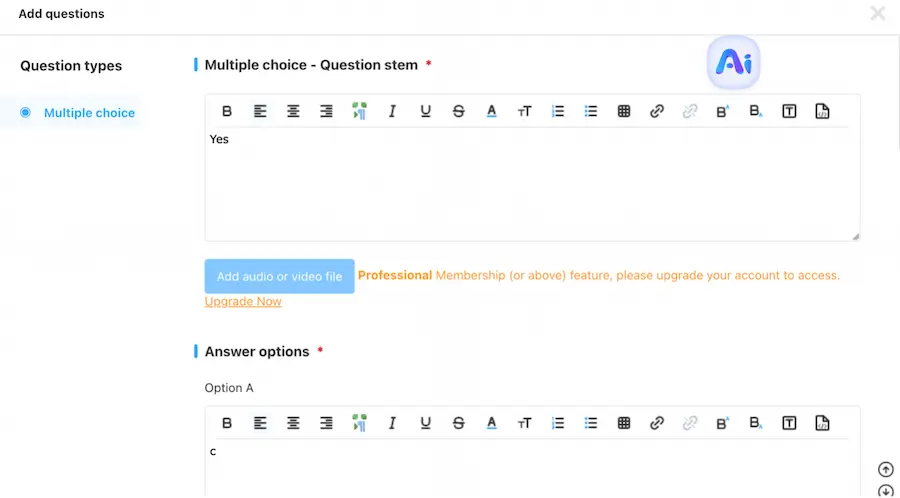
In this section, you can also add video clips, images, or audios just to make the quiz more interactive
3.Configure quiz settings
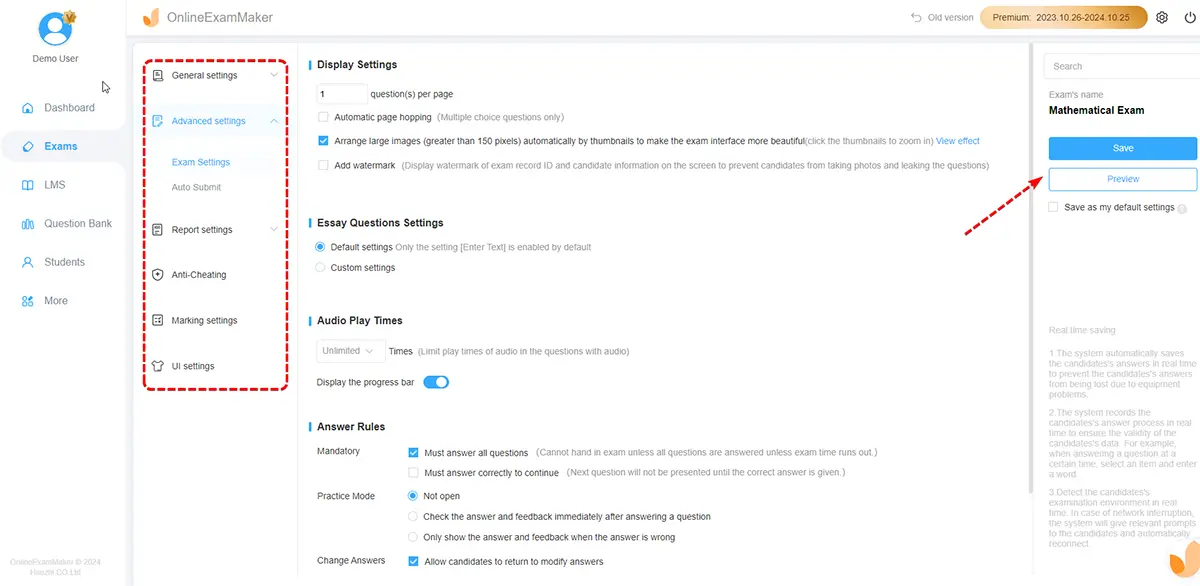
Here, you are able to change variables such as time limits, scoring, and the suppression of answers.
Once you set your settings for your quiz, be sure to preview it, to make sure everything works as it should and save your work.
Share your marketing quiz
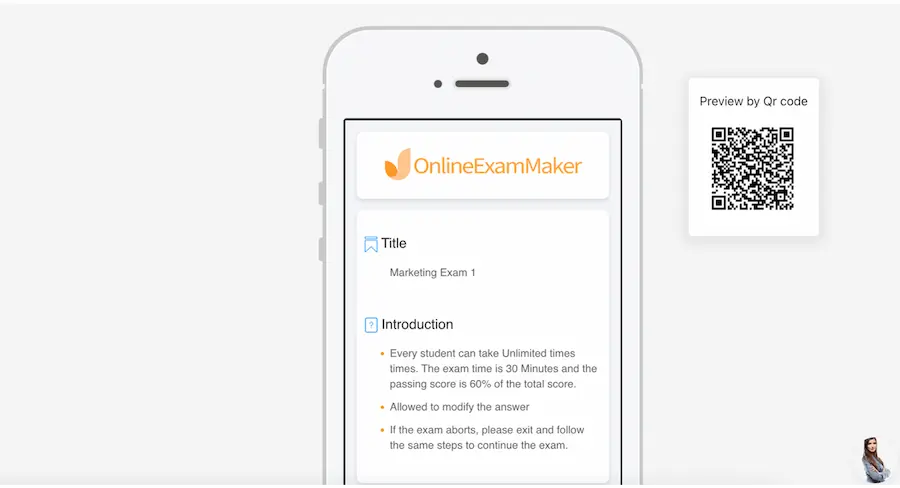
Now, your marketing quiz is ready to go forward. Click the “Publish” button, and OnlineExamMaker will produce a shareable link and a QR code. You are free to distribute the quiz with the help of social media, email campaigns, or embed it directly on your website.
Sharing your quiz on social platforms maximizes its visibility and results in even higher engagement-which now allows users to view your content and even share it within their networks.
Tips to Make A Successful Marketing Quiz
If you do it right, marketing quizzes can move the needle on leads and engagement, and it’s a topic to take up for obtaining really valuable insights into your audience. Here are six ways to make sure your marketing quiz drives the results you want:
1. Define clear goals
Define your objectives before you start building your quiz: Are you trying to capture leads, sell a product, or create brand awareness? Once you know what the main goal is, it can help in shaping your quiz and making sure to create questions answering to that outcome. If you want to get leads, place a sign-up form before showing the results.
2. Know your audience
Work to your advantage by using the target audience’s interests and needs when you create your quiz. The more the quiz is relevant to your users, the greater participation it will get. Think about the pain points of your audience, as well as their interests and preferences. Develop questions speaking to these areas-keeping the quiz fun and informative, of course.
3. Keep it short and engaging
People have really short attention spans, so you’ll want your quiz to be sweet and to the point. Your quiz really shouldn’t take any longer than 2-3 minutes to get through. You should aim for about 5-10 questions, all relatively easy to answer. Don’t use any language that’s too complicated-the quiz should include plenty of images or fun GIFs to help make the experience interactive and entertaining.
4. Create valuable results
The results need to be of actual value to the people taking the quiz. Whether it’s a personality result or some sort of product recommendation, users should walk away with insight that has actionable value or is entertaining in and of itself. This, of course, would incentivize them to share the quiz and have further interaction with your brand.
5. Include compelling call-to-action
Once users complete the quiz, offer them a clear call-to-action. This might get them onto your email list, encourage them to follow you on social media, or ask them to make a purchase. Make the call-to-action in alignment with the quiz results so it feels organic for the user as to what the next step might be.
6. Make it shareable
Want users to share their quiz results on social media? Well, you can do this by presenting the results in a funny, interesting, or really catching way. Add to that some social share buttons for easy sharing that will help extend the reach and visibility of your quiz. By following these, you will be assured that the marketing quiz you will build would not only wildly engage your audience but also help you get closer to the end of your desired business outcomes.